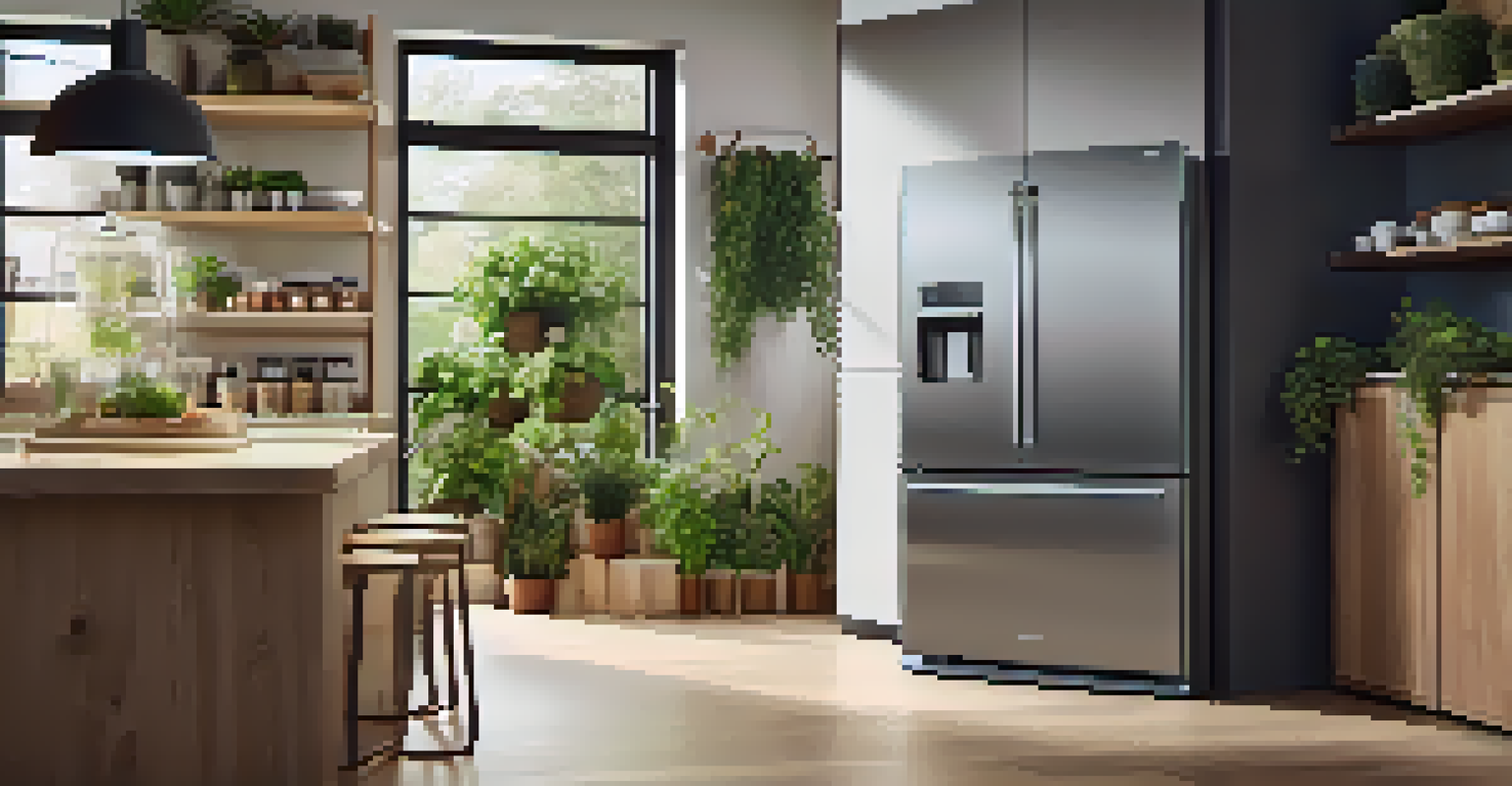The Role of Smart Home Technology in Sustainable Living

Understanding Smart Home Technology and Sustainability
Smart home technology refers to devices and systems that automate and control household functions, enhancing convenience and efficiency. These systems can range from smart thermostats and lighting to advanced security systems. When integrated thoughtfully, they play a crucial role in promoting sustainable living by reducing energy consumption and minimizing waste.
The greatest threat to our planet is the belief that someone else will save it.
Sustainability, on the other hand, is about meeting our needs without compromising future generations' ability to meet theirs. It encompasses efficient resource usage, waste reduction, and a focus on renewable energy sources. The intersection of smart home technology and sustainability is where innovation meets responsibility, creating homes that are not only comfortable but also environmentally friendly.
By adopting smart home technology, homeowners can take significant strides toward sustainability. This tech empowers individuals to monitor their energy usage, manage resources efficiently, and make eco-friendly choices with minimal effort.
Energy Efficiency: The Heart of Smart Homes
One of the most significant benefits of smart home technology is its ability to enhance energy efficiency. Smart thermostats, for example, learn your habits and adjust heating and cooling accordingly, often resulting in substantial energy savings. By optimizing energy consumption, these devices help reduce greenhouse gas emissions associated with traditional heating and cooling methods.

Smart lighting systems also contribute to energy efficiency by utilizing LED bulbs and offering features like motion sensors and timers. These systems ensure that lights are only on when needed, further decreasing electricity usage. The combination of smart thermostats and lighting can lead to a noticeable drop in energy bills while benefiting the environment.
Smart Tech Boosts Energy Efficiency
Integrating smart home devices like thermostats and lighting systems can significantly reduce energy consumption and lower utility bills.
Ultimately, integrating energy-efficient smart devices not only lowers costs for homeowners but also promotes a more sustainable lifestyle. It's a win-win scenario that demonstrates how technology can align with eco-friendly values.
Water Conservation Through Smart Technology
Smart home technology extends beyond energy efficiency to include water conservation. Devices like smart irrigation systems can monitor weather conditions and soil moisture levels, ensuring that gardens and lawns receive just the right amount of water. This technology helps prevent overwatering, leading to significant water savings.
Sustainability is no longer about doing less harm. It's about doing more good.
Additionally, smart leak detectors can identify leaks in plumbing before they become major issues. By alerting homeowners to potential problems, these devices help conserve water and reduce the risk of costly repairs. This proactive approach not only saves water but also protects the home and its occupants.
By embracing smart water management solutions, homeowners can make meaningful contributions to water conservation efforts. Every drop counts, and with the right technology, conserving water becomes an effortless part of daily life.
Waste Reduction: Smart Solutions for a Greener Home
Waste reduction is another critical aspect of sustainable living, and smart home technology offers innovative solutions to help achieve this goal. For instance, smart refrigerators can track food inventory and expiration dates, prompting users to consume items before they go bad. This feature helps minimize food waste, which is a significant contributor to greenhouse gas emissions.
Moreover, smart home systems can assist in managing recycling and composting efforts. Some devices can provide reminders for recycling days or even help organize waste based on local guidelines, making it easier for homeowners to participate in sustainable practices. The convenience of technology encourages more people to adopt eco-friendly habits.
Water Conservation with Smart Tools
Smart irrigation systems and leak detectors help homeowners manage water usage effectively, promoting conservation and reducing waste.
By integrating smart solutions for waste management, households can significantly reduce their environmental footprint. This proactive approach to waste reduction not only benefits the planet but also fosters a culture of sustainability within the home.
Enhancing Indoor Air Quality with Smart Tech
Indoor air quality (IAQ) is a crucial yet often overlooked aspect of sustainable living. Smart home technology can play a significant role in monitoring and improving IAQ. Devices such as smart air purifiers and humidity sensors work together to create a healthier living environment by detecting pollutants and maintaining optimal humidity levels.
By regularly monitoring air quality, homeowners can take action to reduce indoor pollutants from sources like cooking, cleaning products, and even furniture. Improved IAQ not only enhances comfort but also contributes to overall well-being, making homes healthier places to live.
Investing in smart air quality management systems shows a commitment to both personal health and environmental sustainability. With cleaner air indoors, families can enjoy a more comfortable and eco-friendly living space.
Renewable Energy Integration in Smart Homes
As the world shifts toward renewable energy sources, smart home technology plays a pivotal role in facilitating this transition. Solar panels, for example, can be integrated into smart home systems to optimize energy usage based on real-time production data. This allows homeowners to make the most of their renewable energy investments.
Smart energy management systems can also prioritize energy consumption based on availability. For instance, during sunny days, homeowners can schedule energy-intensive tasks like laundry or dishwashing to take advantage of solar energy. This not only maximizes efficiency but also reduces reliance on fossil fuels.
Sustainable Living Through Innovation
The combination of smart home technology and renewable energy solutions empowers homeowners to adopt eco-friendly practices and contribute to a sustainable future.
By embracing renewable energy through smart technology, homeowners can significantly contribute to a more sustainable future. It's a proactive step toward reducing carbon footprints while enjoying the benefits of modern conveniences.
The Future of Smart Homes and Sustainability
The future of smart homes is undeniably intertwined with sustainability. As technology continues to evolve, we can expect even more innovative solutions to emerge, making it easier for homeowners to adopt sustainable practices. From AI-driven energy management to advanced water conservation systems, the possibilities are endless.
As awareness of environmental issues grows, consumers are increasingly seeking homes that reflect their values. This trend is pushing manufacturers and developers to prioritize sustainability in their smart home offerings. The result is a market that not only caters to convenience but also champions eco-friendly solutions.

In conclusion, the role of smart home technology in sustainable living is set to expand, providing homeowners with the tools they need to make responsible choices. Embracing these technologies is not just a personal benefit; it's a step toward a more sustainable and harmonious relationship with our planet.